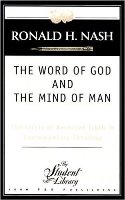A Brief Book Summary from Books At a Glance
About the Author
Ronald Nash was a Christian philosopher and professor. He was the author of more than thirty books.
Introduction
In this book Ronald Nash tackles the philosophical and theological issues that cluster around revelation, language, and truth. He examines the developments in the history of philosophy that have led to skepticism about our human ability to know God truly. Nash also critiques the arguments of those who deny that the verbal revelation of the Bible is capable of communicating literal, propositional truth. Nash argues that the solution to epistemological skepticism is rooted in the logos of God and his communication of his logos to human beings who are created in his image. God has constructed our minds to share in his rational nature and to express truth through language. As a result, human beings can truly know things about God, and the Bible can be accepted as completely true, reliable, and knowable.
Table of Contents
Preface
Introduction: The Unknown God
Chapter 1 Hume’s Gap: The Divorce of Faith and Knowledge
Chapter 2 Theological Agnosticism from Kant to Ritschl
Chapter 3 The Assault on Propositional Revelation
Chapter 4 A Defense of Propositional Revelation
Chapter 5 A Brief but Necessary Interlude
Chapter 6 The Christian Logos
Chapter 7 Rationalism and Empiricism
Chapter 8 The Christian Rationalism of St. Augustine
Chapter 9 The Religious Revolt Against Logic
Chapter 10 Reason and Revelation
Chapter 11 Reason, Revelation and Language
Chapter 12 Revelation and the Bible
Summary
Chapter 1
Hume’s Gap: The Divorce of Faith and Knowledge
The work of the Scottish philosopher David Hume (1711-1776) has led many people to be skeptical of Christianity’s truth claims. Hume argued that human beings are unable to demonstrate that their basic beliefs — in things like cause and effect relationships, the external world, and the existence of the “self” — are truly known. People believe that such things really do exist, but neither human reason nor reflection on sense experiences can prove that they do. There are limits to human reason. Much of our fundamental beliefs are based on instinct and custom, not rationality. In ethics we are slaves to our non-rational nature. Hume’s Gap, then, is the unbridgeable distance between the transcendent and human knowledge.
For Hume, many things had to be — and should be — accepted on the basis of faith. He did not doubt that either he or the external world existed, but insisted that claims to knowledge had to be restricted. Hume has often been represented as an atheist who tried to disprove the existence of God and miracles. This, however, is a misrepresentation: Hume believed that nobody could have knowledge about God. As a result, when philosophers claimed to have constructed logical proofs of God’s existence, or when Christians made theological claims about God, Hume was skeptical. Hume’s Gap, therefore, precludes the rational knowledge
[To continue reading this summary, please see below....]The remainder of this article is premium content. Become a member to continue reading.
Already have an account? Sign In
Buy the books

The Word Of God And The Mind Of Man